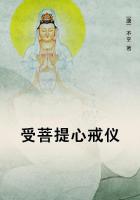Poetry in general seems to have sprung from two causes, each of them lying deep in our nature. First, the instinct of imitation is implanted in man from childhood, one difference between him and other animals being that he is the most imitative of living creatures, and through imitation learns his earliest lessons; and no less universal is the pleasure felt in things imitated. We have evidence of this in the facts of experience. Objects which in themselves we view with pain, we delight to contemplate when reproduced with minute fidelity: such as the forms of the most ignoble animals and of dead bodies. The cause of this again is, that to learn gives the liveliest pleasure, not only to philosophers but to men in general; whose capacity, however, of learning is more limited. Thus the reason why men enjoy seeing a likeness is, that in contemplating it they find themselves learning or inferring, and saying perhaps, 'Ah, that is he.' For if you happen not to have seen the original, the pleasure will be due not to the imitation as such, but to the execution, the coloring, or some such other cause.
Imitation, then, is one instinct of our nature. Next, there is the instinct for 'harmony' and rhythm, meters being manifestly sections of rhythm. Persons, therefore, starting with this natural gift developed by degrees their special aptitudes, till their rude improvisations gave birth to Poetry.
Poetry now diverged in two directions, according to the individual character of the writers. The graver spirits imitated noble actions, and the actions of good men. The more trivial sort imitated the actions of meaner persons, at first composing satires, as the former did hymns to the gods and the praises of famous men. A poem of the satirical kind cannot indeed be put down to any author earlier than Homer; though many such writers probably there were. But from Homer onward, instances can be cited- his own Margites, for example, and other similar compositions. The appropriate meter was also here introduced; hence the measure is still called the iambic or lampooning measure, being that in which people lampooned one another. Thus the older poets were distinguished as writers of heroic or of lampooning verse.
As, in the serious style, Homer is pre-eminent among poets, for he alone combined dramatic form with excellence of imitation so he too first laid down the main lines of comedy, by dramatizing the ludicrous instead of writing personal satire. His Margites bears the same relation to comedy that the Iliad and Odyssey do to tragedy. But when Tragedy and Comedy came to light, the two classes of poets still followed their natural bent: the lampooners became writers of Comedy, and the Epic poets were succeeded by Tragedians, since the drama was a larger and higher form of art.
Whether Tragedy has as yet perfected its proper types or not; and whether it is to be judged in itself, or in relation also to the audience- this raises another question. Be that as it may, Tragedy- as also Comedy- was at first mere improvisation. The one originated with the authors of the Dithyramb, the other with those of the phallic songs, which are still in use in many of our cities. Tragedy advanced by slow degrees; each new element that showed itself was in turn developed. Having passed through many changes, it found its natural form, and there it stopped.
Aeschylus first introduced a second actor; he diminished the importance of the Chorus, and assigned the leading part to the dialogue. Sophocles raised the number of actors to three, and added scene-painting. Moreover, it was not till late that the short plot was discarded for one of greater compass, and the grotesque diction of the earlier satyric form for the stately manner of Tragedy. The iambic measure then replaced the trochaic tetrameter, which was originally employed when the poetry was of the satyric order, and had greater with dancing. Once dialogue had come in, Nature herself discovered the appropriate measure. For the iambic is, of all measures, the most colloquial we see it in the fact that conversational speech runs into iambic lines more frequently than into any other kind of verse; rarely into hexameters, and only when we drop the colloquial intonation. The additions to the number of 'episodes' or acts, and the other accessories of which tradition tells, must be taken as already described; for to discuss them in detail would, doubtless, be a large undertaking.















